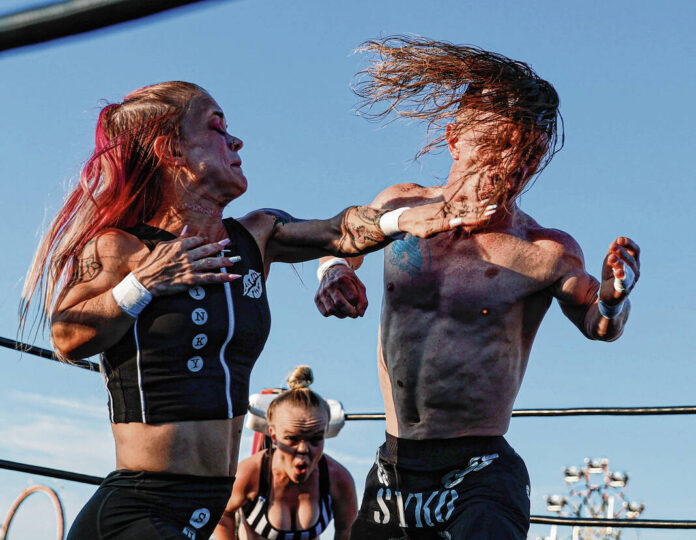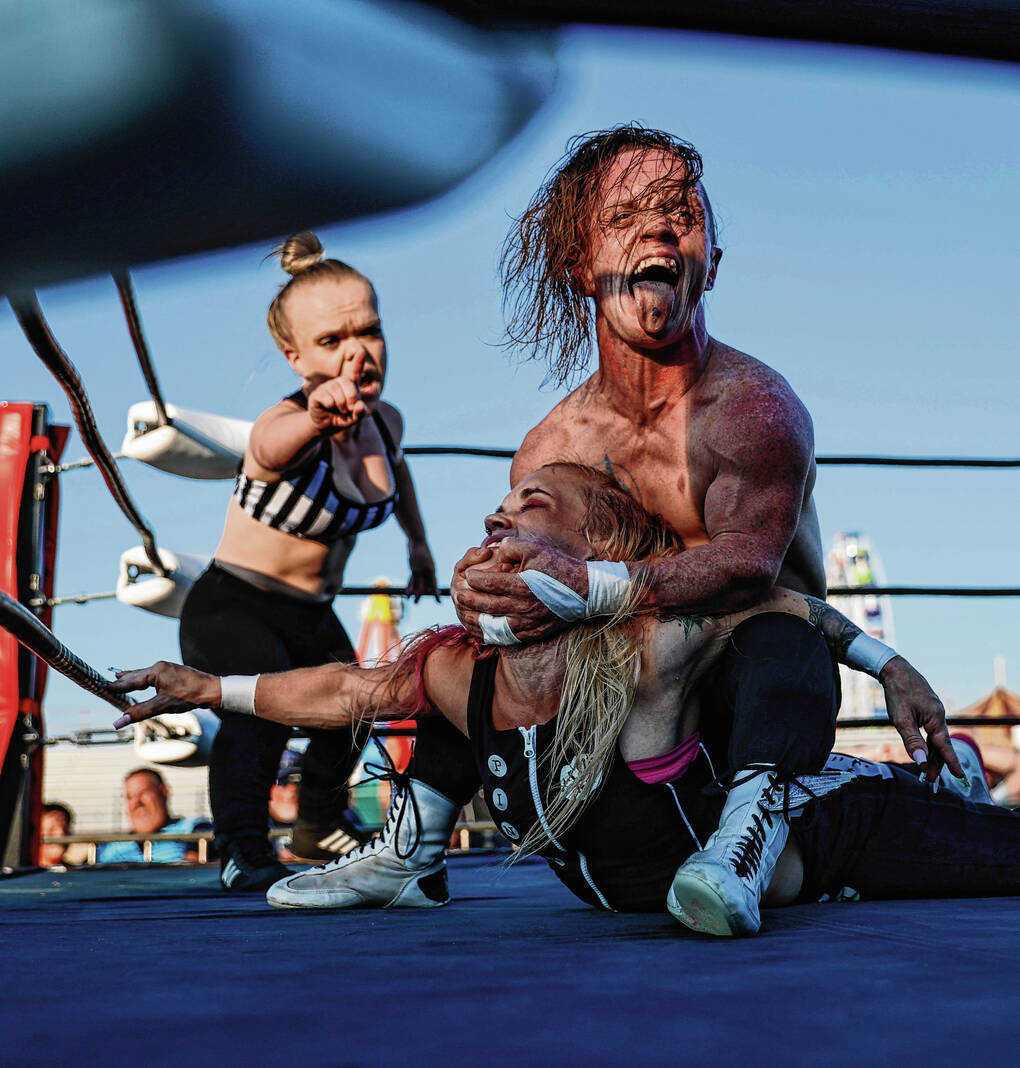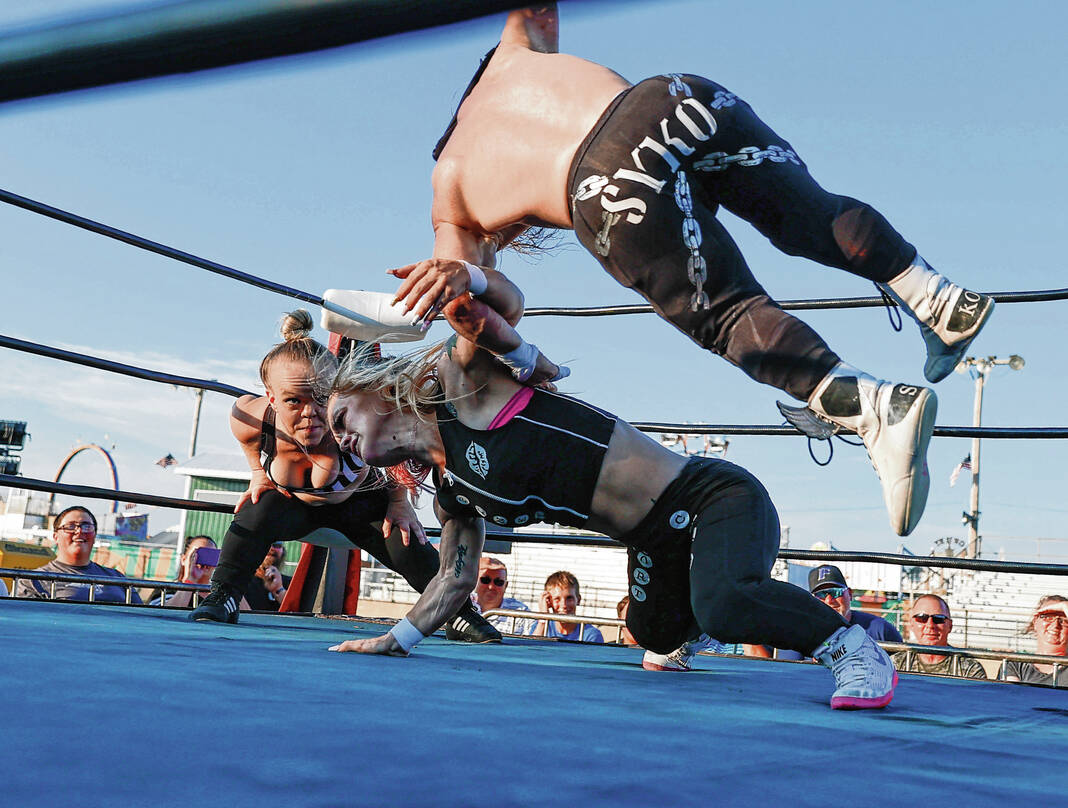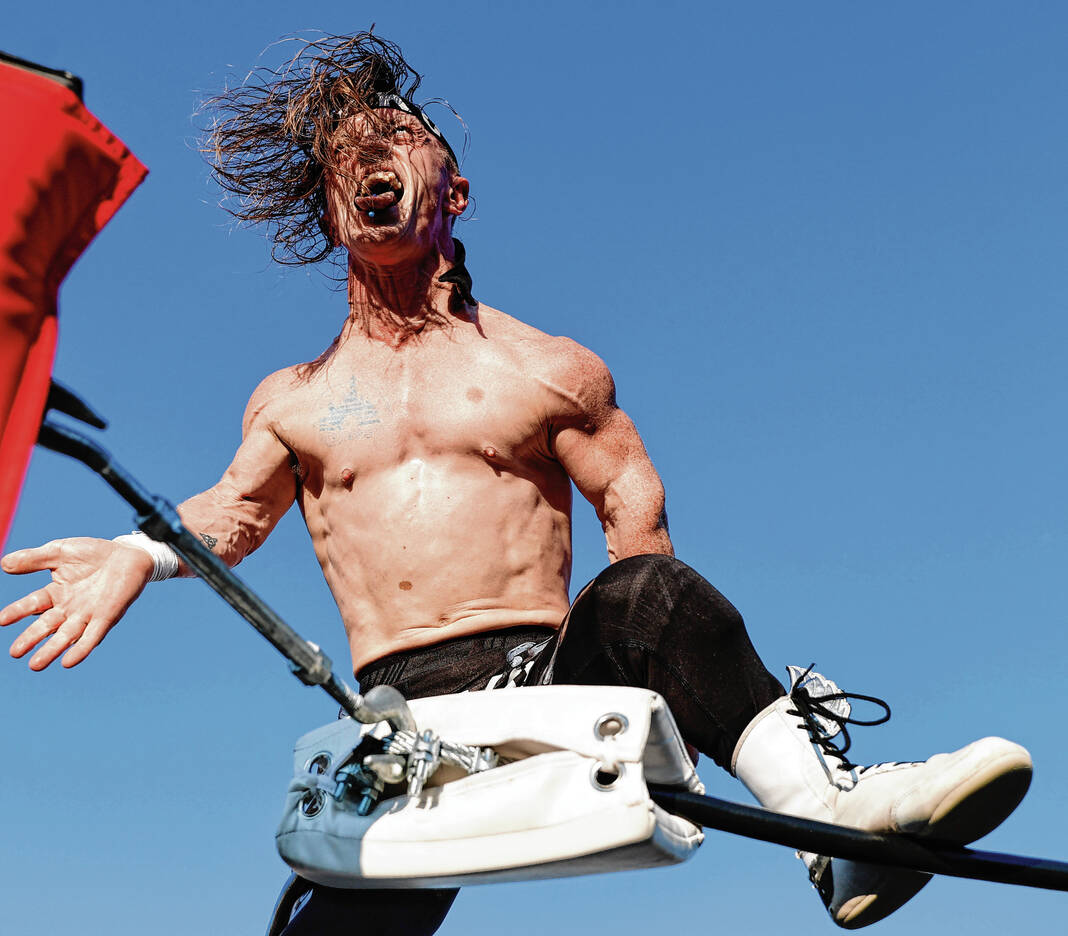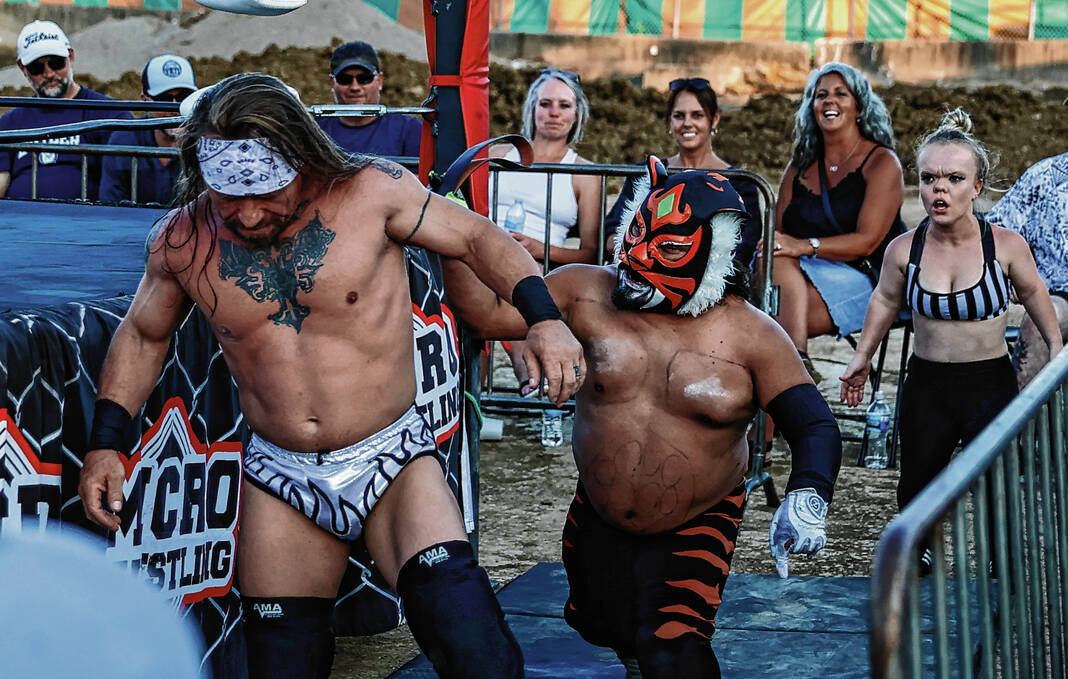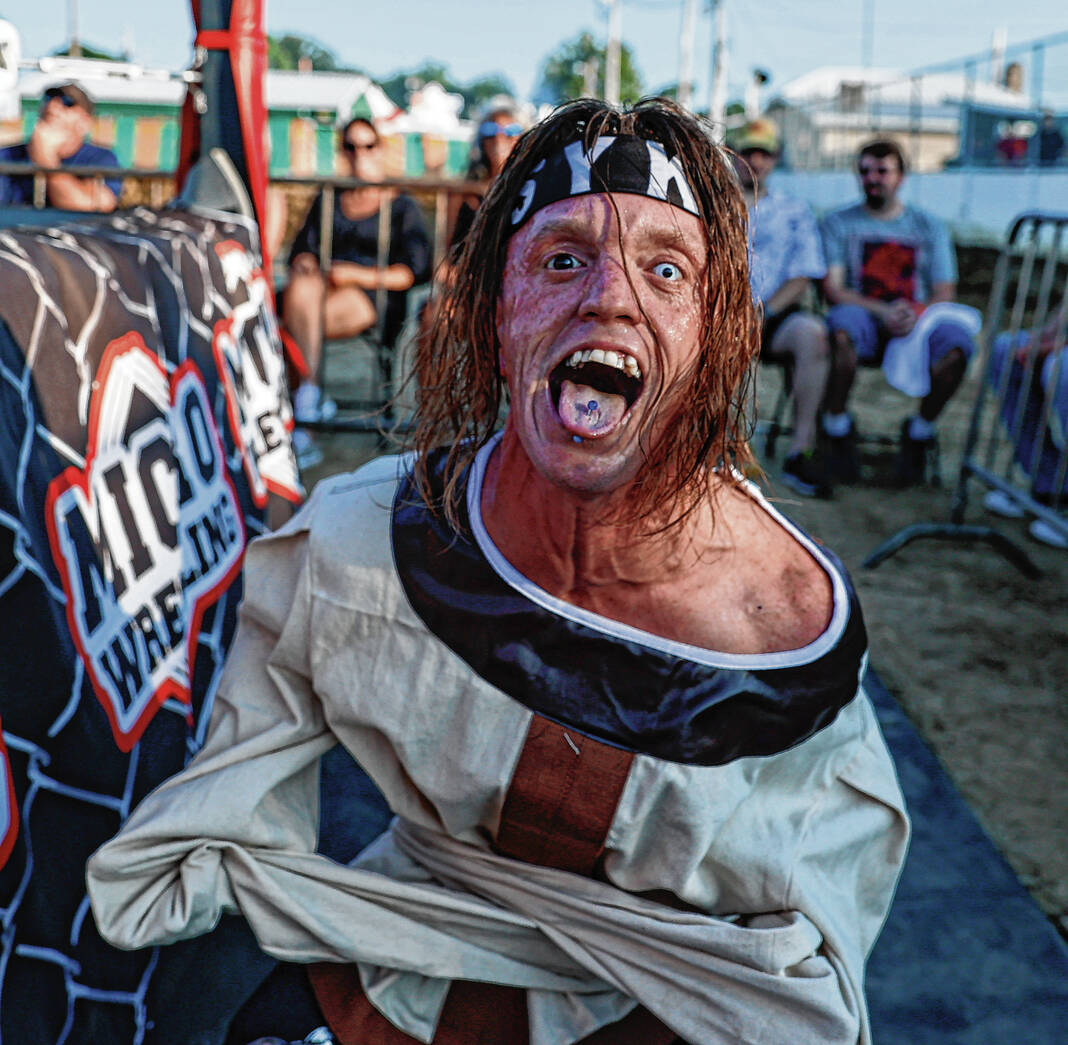In front of a standing-room-only grandstand at the Johnson County Fair Tuesday, a 3-foot-6 performer and WWE-style wrestler named Micro Jackson, donning a sparkling glove and red jacket, grooved to “Wanna Be Starting Something” and “Beat It.”
The dance routine preceded some high-flying action involving wrestlers of similar stature drawing cheers and awe as they traded suplexes, clotheslines and power slams. Others kicked their foes off the mat or hit them with props such as a wet floor sign and a plunger, which wrestler Pinky Shortcake used to her advantage against her opponent, SyKo.
Although they don’t stand as tall as most of the people watching them, members of the Micro Wrestling Federation have found a way for people to look up to them, as they’ve followed a path to stardom that brings them hundreds, or even thousands, of fans each night they perform.
Micro Jackson, whose real name is DeShawn Richardson, got his stage name from his origin as a dancer growing up in Georgia.
“I decided I was going to be an entertainer. I was a dancer and in high school, no other job was working out for me. Making little money don’t work for me,” Richardson said. “I knew about micro wrestling about three years before I came here. My girlfriend said, ‘You have people that look like you.’”
Derec Pemberton, who performs as SyKo, was a high school wrestler in Kansas City, Kansas and started his own micro wrestling company 10 years ago before it was shut down by a sports commission. From there, he went to work with Extreme Midget Wrestling, where he performed for six years before spending the most recent year at the Micro Wrestling Federation.
“Out there, it was extremely hard to find other people and midgets, so I started my own company, just me and my brother, who is also a midget or little person,” Pemberton said. “Me and my brother grew up around the carnival, and we were always doing show business. He has done some wrestling, but not continuously. We are both in the limelight because we’re both big TikTok stars.”
Domenic “Disco Dom” Feldi, hailing from Lancaster, Pennsylvania, saw a social media post by the federation but he didn’t have a video demonstrating athletic moves for wrestling. Despite that, he got a call about six months later asking if he was still interested in being a wrestler.
“My thought process was, I wanted to be a wrestler all my life,” Feldi said. “The opportunity came up and I wanted to try it out, and since then, I’ve been blooming.”
Ashley Waterhouse, known as Pinky Shortcake in the ring, has some of the deepest roots in professional wrestling. Originally from Maine, her father and uncle served as Queasy and Sleazy, respectively — two of the three kings for Jerry Lawler of the former World Wrestling Federation.
“It was pretty awesome. I got to walk my dad out as a manager and when I was a baby, and I rang the bell to start the matches. I met some pretty top guys. I’ve known Tony Atlas, Sabu,” Waterhouse said. “I kind of decided after graduating high school, I was going to go out and start my journey. A year later, I started micro wrestling under a different company.”
The other female wrestler in the crew that traveled to the Johnson County Fair, BreAnnah “Little Miss” Belliveau, said she followed in her brother Ryan’s footsteps. After originally not caring for wrestling, the Vermont native, part of her family’s fourth generation of little people, decided to give it a shot and is now in her sixth year wrestling.
Although the wrestlers can earn between $50,000 and $75,000 a year, they perform five to six shows a week. Many of those shows take place at the headquarters of the federation in Pigeon Forge, Tennessee, but much of their profession takes them on the road.
Waterhouse, a nine-year micro wrestler, has been to London, Wales, Germany, Mexico and all 48 contiguous states, and she now brings her baby on her travels. Richardson, however, has had extended periods away from his family, he said.
“It’s a lot of traveling, it’s a lot of dedication and I say it is different,” Richardson said. “Sometimes it’s difficult for obvious reasons of being away from your family. Thank God for FaceTime and being able to know the long run of what you’re doing it for. It’s the people who are out there and who cheer you on. It’s the interviews that come and people are so fascinated. People are fascinated by me anyway, but now they’re fascinated by ‘he’s a little person and Micro Jackson.’ They know me for my name other than my appearance.”
Being on the road with other little people forms a community for the wrestlers, who had previously faced discrimination in other environments.
“Some of the guys have never been around other little people. Working here for this job, a lot of us can excel at it and succeed,” Belliveau said. “We’re not discriminated against by this job and by this place of employment. If I get a job at McDonald’s, I can be discriminated against — and I have been discriminated against by several different jobs.”
Richardson said he has also faced discrimination, not only because of his height, but because of his race as a Black man.
“I’m short and Black so sometimes when people judge me, I’m wondering which one, but because of my personality and the way I carry myself, I’ve never had to deal with hardcore bullying because I won’t allow it to happen,” Richardson said. “For me, I have to work two times harder to make people respect what I do.”
In the ring, however, those preconceived notions and discriminatory thoughts often break down, Pemberton said.
“I know when someone sees the show, their perception of my ability to do things is always different than when they leave,” he said. “I love to be underestimated.”
Those reactions include children who become fans of the micro wrestlers.
“My favorite thing is the kids’ expressions and how much fun they’re having,” Waterhouse said. “It’s to show no matter how tall, short, skinny or fat you are, you can do whatever you set your mind to.”


